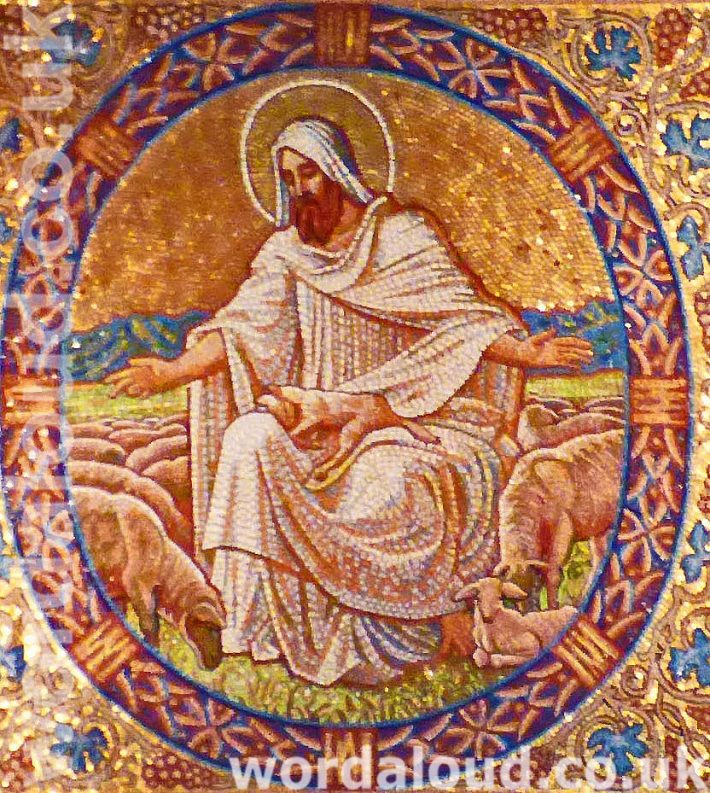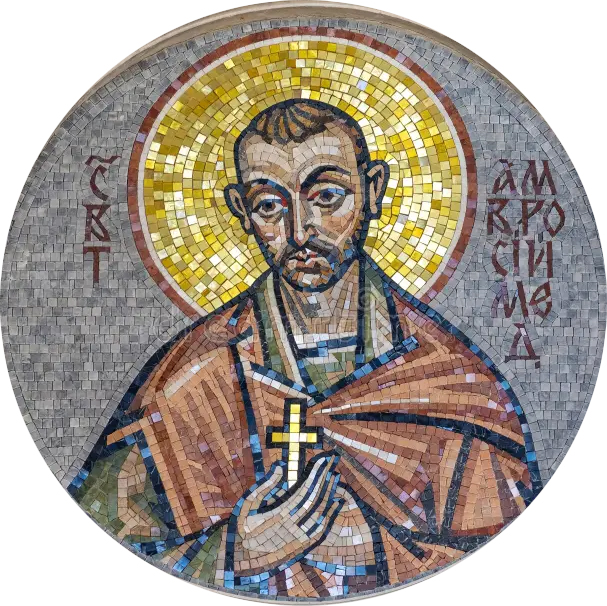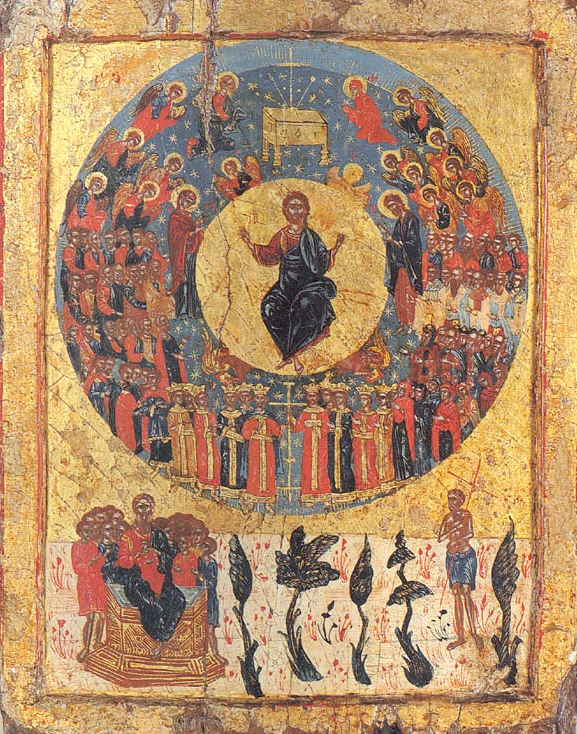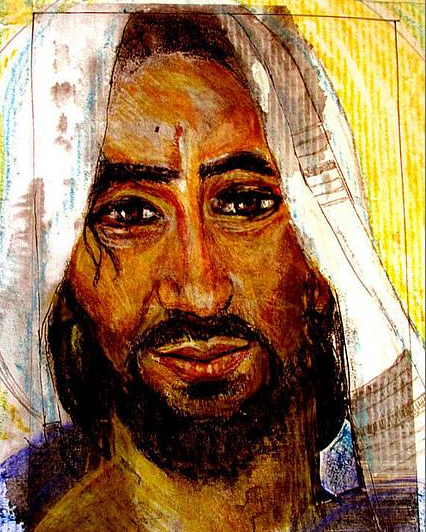Christian Art | Jesus Christ Is The Good Shepherd
Office Of Readings | Week 24, Wednesday, Ordinary Time | From The Sermon Of Saint Augustine On The Shepherds | Let Each One Seek Not What Is His But What Is Jesus Christ’s
‘Let each one seek not what is his but what is Jesus Christ’s.’
Saint Augustine continues his interpretation of the prophet Ezekiel’s condemnation of negligent shepherds (Ezekiel 34). His focus now turns from ‘milk’ to ‘wool’, using these images to explore the dangers of pastors seeking their own comfort and honour rather than Christ’s glory and the good of the flock.
For Augustine, ‘milk’ represents the material sustenance pastors receive from the faithful, while ‘wool’ signifies the honour and esteem they are given. Both are legitimate when rightly ordered: the people’s support sustains their pastors, and their honour covers the weakness of those who, though mortal and frail, are entrusted with spiritual authority. Yet these same gifts become dangerous when they tempt pastors to complacency, self-protection, or silence in the face of sin.
The example of Paul once more provides the corrective. The Galatians had received him ‘as an angel of God’, even to the point of declaring they would give him their very eyes. Paul accepts this testimony of honour but does not allow it to deter him from speaking hard truths. When necessary, he rebukes and corrects, even at the risk of alienating those who once praised him. His words, ‘Have I then become your enemy by preaching the truth?’ (Galatians 4:16) demonstrate that true pastoral care is measured not by popularity but by fidelity to Christ.
Augustine highlights the danger of a shepherd reasoning: ‘My sustenance is safe, and my honour too, so let each one do as he likes.’ Such an attitude betrays the flock, leaving them vulnerable to error and sin. True pastoral service is not about securing one’s own position but about seeking what belongs to Christ—truth, correction, and the healing of souls. The image of cutting into the wound illustrates this: painful though it may be, it is the duty of a shepherd to bring healing through truth, even if it means risking rejection.
Underlying Augustine’s teaching is a vision of solidarity within the body of Jesus Christ. Pastors are not set apart for privilege but for responsibility; they remain members of the same body they serve. If one member suffers, all suffer together. Thus, the pastor who seeks only milk and wool—comfort and honour—separates himself from the flock. The pastor who seeks Christ above all, however, remains truly one with the people, bearing with their weakness and labouring for their healing.
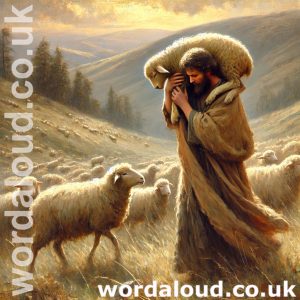
From The Sermon Of Saint Augustine On The Shepherds | Let Each One Seek Not What Is His But What Is Jesus Christ’s
I have explained what it means to consume milk. Now let us consider what it means to clothe with wool. One who gives milk gives sustenance, while one who gives wool gives honor. These are precisely the two things that pastors, who feed themselves and not the sheep, look for from the people—the benefit of having their wants supplied as well as the favor of honor and praise.
Yes, clothing can well be taken to mean honor, since it covers nakedness. For every man without exception is weak. And who is any man placed over you except someone just like yourself. Your pastor is in the flesh, he is mortal, he eats, sleeps and awakens; he was born and he is going to die. In himself he is, when you think of it, simply a man. But it is true that you make him something more by giving him honor; it is as if you were covering what is weak.
Consider the nature of the clothing that the apostle Paul received from God’s good people. He said: You have received me like an angel of God. I testify that if it were possible you would have torn out your eyes and given them to me. Indeed great honor was shown to him. But did he then spare sinners because of that honor, perhaps out of fear that it would be refused and that he would receive less praise when he gave blame? Had he done so, he would be among those shepherds who feed themselves and not the sheep. He would then say to himself: ‘What has this to do with me? Let everyone do what he will; my sustenance is safe, and my honor too. I have enough milk and wool, so let each one do as he likes.’ But then are things really secure for you if each one does as he pleases? I do not want to make you a leader over the people but one of them. If one member suffers, all the members suffer with him.
In recalling how they treated him, the Apostle does not want to appear forgetful of the honor they did him. Therefore he gives testimony that they received him like an angel of God, that if it were possible, they were willing to tear out their eyes and give them to him. Yet he still comes to the sheep that is ill, to the one that is diseased, to cut the wound and not to spare the diseased part. He says: Have I then become your enemy by preaching the truth? He took from the milk of the sheep, as I mentioned a short time ago, and he was clothed with their wool, but he did not neglect his sheep. He did not seek what was his but what was Christ’s.
Christian Prayer With Jesus Christ
Prayer
Lord Jesus Christ,
you are the true Shepherd who laid down your life for the sheep.
Guard your Church from those who seek their own gain and honour,
and raise up faithful pastors who will speak your truth with courage,
not sparing themselves but labouring for the healing of your people.
Grant us hearts open to correction,
that together as one body we may seek not what is ours,
but what belongs to you,
who live and reign with the Father and the Holy Spirit,
one God, for ever and ever.
Amen.
Glossary Of Christian Terms
Shepherds – In Augustine’s sermon, this refers to Church leaders, particularly bishops and priests, responsible for guiding and caring for the faithful.
Milk – A metaphor for material sustenance provided by the faithful for their pastors. Legitimate in itself, but wrongly sought when it becomes a pastor’s main concern.
Wool – A metaphor for honour, respect, and esteem given to pastors, ‘covering’ their human frailty. It becomes dangerous if pastors seek it at the expense of truth.
Paul (the Apostle) – Early Christian missionary and writer of many New Testament letters. Augustine frequently cites him as a model of pastoral integrity.
Galatians – A Christian community in Asia Minor (modern-day Turkey) to whom Paul wrote the Letter to the Galatians. In 4:14–16, he recalls their honouring of him, while also rebuking them in truth.
Angel of God – The way the Galatians received Paul, acknowledging him as a messenger of divine truth.
Body of Christ – The image used by Paul (1 Corinthians 12) to describe the Church: all members are united, sharing in both suffering and joy.
Correction – A key pastoral duty, often difficult, but essential for guiding the flock toward holiness.

